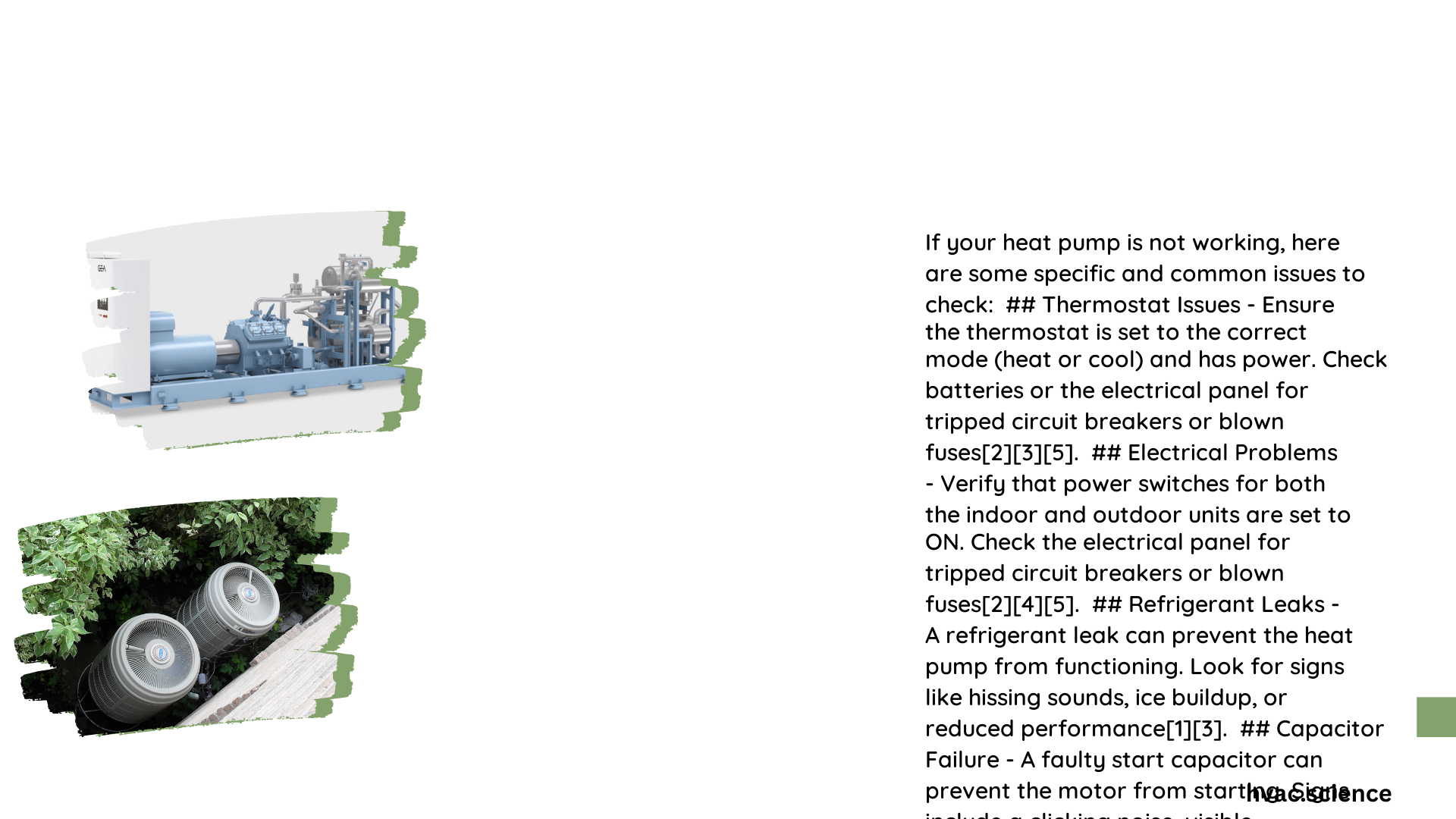Heat pumps are efficient heating and cooling systems, but they can sometimes fail to operate correctly. When a heat pump doesn’t work, it can leave homeowners without proper temperature control. Common issues include thermostat problems, electrical faults, airflow restrictions, and component failures. This comprehensive guide will help you diagnose and potentially resolve issues when your heat pump doesn’t work, covering everything from simple fixes to more complex problems requiring professional intervention.
Why Does My Heat Pump Not Turn On?
One of the most frustrating scenarios is when your heat pump fails to start. Several factors can contribute to this issue:
- Power Supply Problems: Check if the circuit breaker has tripped or if there’s a blown fuse.
- Thermostat Issues: Ensure the thermostat is set correctly and has power.
- Faulty Starter Capacitor: A defective capacitor can prevent the compressor from starting.
- Frozen Outdoor Unit: Ice buildup can hinder the heat pump’s operation.
To troubleshoot, first verify the power supply and thermostat settings. If these are correct, listen for a clicking sound from the outdoor unit, which might indicate a faulty capacitor. For a frozen unit, allow it to defrost and check for underlying causes like low refrigerant levels.
What Causes a Heat Pump to Stop Heating?

When your heat pump is running but not producing heat, consider these potential causes:
- Incorrect Thermostat Settings: Verify the thermostat is set to ‘Heat’ mode.
- Dirty Air Filters: Clogged filters restrict airflow, reducing heating efficiency.
- Low Refrigerant Levels: A refrigerant leak can significantly impair heating performance.
- Faulty Reversing Valve: This component switches the heat pump between heating and cooling modes.
- Compressor Issues: A malfunctioning compressor can’t circulate refrigerant effectively.
Start by checking the thermostat settings and air filters. If these are not the issue, you may need to call a professional to check refrigerant levels and inspect the reversing valve and compressor.
How Can I Diagnose Electrical Problems in My Heat Pump?
Electrical issues can cause your heat pump to stop working entirely. Here’s how to diagnose them:
- Check the circuit breaker and reset if tripped.
- Inspect the disconnect box near the outdoor unit for any visible damage.
- Verify that all power switches for both indoor and outdoor units are in the ‘ON’ position.
- Look for any signs of burnt or frayed wires.
- Test the thermostat by setting it to different modes and temperatures.
If you’re uncomfortable working with electrical components, it’s best to call a licensed HVAC technician to perform these checks safely.
What Are the Signs of Low Refrigerant in a Heat Pump?
Low refrigerant levels can significantly impact your heat pump’s performance. Look out for these signs:
- Decreased heating or cooling output
- Ice formation on the outdoor unit
- Hissing sounds near the indoor unit
- Higher than usual energy bills
If you suspect a refrigerant leak, it’s crucial to have a professional HVAC technician inspect and repair the system. Refrigerant handling requires specialized equipment and certification.
How Often Should Heat Pump Maintenance Be Performed?
Regular maintenance is key to preventing heat pump failures. Here’s a recommended maintenance schedule:
| Maintenance Task | Frequency |
|---|---|
| Change air filters | Every 1-3 months |
| Clean outdoor unit | Twice a year |
| Professional inspection | Annually |
| Check refrigerant levels | Annually |
| Clean ductwork | Every 3-5 years |
Adhering to this schedule can help prevent many common issues and extend the lifespan of your heat pump.
What Are the Costs Associated with Heat Pump Repairs?
The cost of repairing a heat pump can vary widely depending on the issue. Here’s a general breakdown:
- Thermostat replacement: $100 – $300
- Capacitor replacement: $150 – $400
- Refrigerant recharge: $200 – $600
- Reversing valve replacement: $500 – $900
- Compressor replacement: $1,500 – $2,500
Labor costs typically range from $75 to $150 per hour. Always get multiple quotes from licensed HVAC professionals before proceeding with major repairs.
When Should I Replace My Heat Pump Instead of Repairing It?
Consider replacing your heat pump if:
- It’s more than 10-15 years old
- Repair costs exceed 50% of the cost of a new unit
- Your energy bills have increased significantly
- The heat pump requires frequent repairs
- It no longer maintains comfortable temperatures
A new, energy-efficient heat pump can often provide significant long-term savings on energy costs, offsetting the initial investment.
By understanding these common issues and their solutions, you can better diagnose and address problems when your heat pump doesn’t work. Remember, while some troubleshooting steps can be performed by homeowners, many heat pump repairs require the expertise of a licensed HVAC professional to ensure safe and effective resolution.
References:
1. Douglas Cooling & Heating
2. Cielo Wigle
3. The Furnace Outlet
